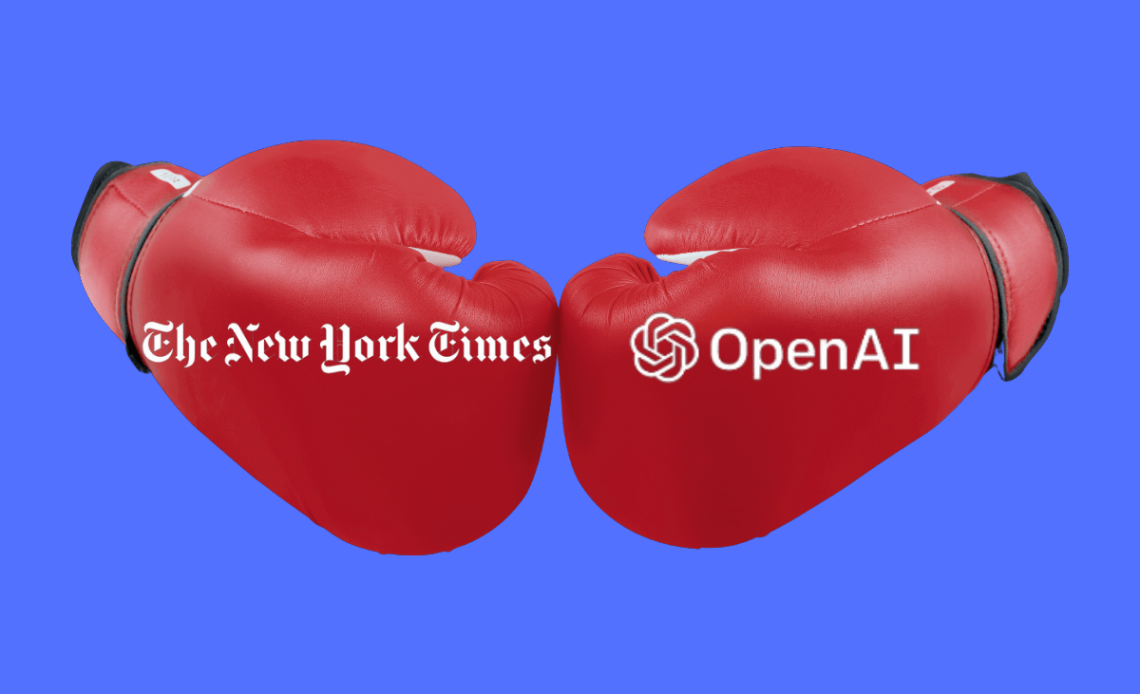
No matter which side you think will win the battle, there is no doubt that the New York Times’ new lawsuit against OpenAI and Microsoft for copyright infringement, filed last Wednesday, will be one of the most important copyright fights to watch in 2024.
The Gray Lady vs. the Generative AI Bros? Pass the popcorn, please. The lawsuit maintains the defendants should be held responsible for “billions of dollars in statutory and actual damages” related to the “unlawful copying and use of The Times’s uniquely valuable works.” It also calls for OpenAI and Microsoft to destroy any chatbot models and training data that use New York Times copyrighted material.
Here’s why this case is so munch-worthy in what may be a make-or-break year for AI and copyright: For one thing, legal experts have long predicted that a case around AI and copyright could make it to the Supreme Court — and a high profile case like the New York Times vs. Microsoft and OpenAI could be just the ticket to a date with the nine justices.
Generative AI copyright battles have been brewing for over a year
Back in August 2022, before ChatGPT was released, I spoke to Bradford Newman, a partner at law firm Baker McKenzie in its Palo Alto office, about the legal battles brewing around generative AI.
“Legally, right now, there is little guidance,” he warned. “There are the inevitable class actions, but the net net of it all is when you’re using the massive data sets that these AI applications are and you sprinkle on top of that open source licenses…the arguments are going to be fair use versus infringement.”
Different courts, he predicted, will come to different conclusions. “Ultimately, I believe this is going to go to the Supreme Court.”
In addition, industries affected by generative AI are not taking a wait-and-see attitude when it comes to copyright issues, particularly in areas such as publishing and entertainment. Marc Rotenberg, president and founder of the nonprofit Center for AI and Digital Policy, as well as an adjunct professor at Georgetown Law School, spoke to me in September for a deep-dive article into copyright issues around AI training data. He was waiting, he said, for the New York Times to make a legal move against OpenAI.
The New York Times-OpenAI matchup has arrived
He pointed to the famous Authors Guild v. Google, a federal copyright case that centered on whether Google Books’ effort to digitize books constituted “fair use,” and wound its way through the courts for a decade before being decided in Google’s favor in 2015.
“Google did very well there in the outcome as a legal matter, but the publishers and the news industry did not, and there was a real consequence that the publishing industry and journalism is in trouble,” Rotenberg told me. “It’s the reason that the New York Times, which survived the first battle, even as many regional and local news organizations collapsed, is suddenly aware that they may be in trouble too.”
The big takeaway, he continued, is that if AI models, which need high-quality data, could also replicate what the New York Times offers, the news giant could go out of business. “So to me, it’s one of the most interesting legal cases today involving AI…the looming battle between one of the most well regarded publishers, The New York Times, and one of the most impactful generative AI firms OpenAI.”
OpenAI lawyers are ready to play defense
There is no reason to doubt that OpenAI and Microsoft are fully-prepared to play strong defense in this case. Back in July, I spoke to a prominent attorney specializing in copyright law who is helping to defend OpenAI in at least one of the cases filed in 2023 by authors accusing the company of infringing their copyrights. He told me that the cases focused on generative AI and copyright will play a huge role in “shaping the pace and contours of innovation” as well as the understanding the role of copyright law.
“I think every 20 years or so, there’s a new, really significant question that comes along and forms how the commercial world works,” he said. “We had a case in the early 1980s that went to the Supreme Court over the VCR. We had a whole wave of cases over Web 2.0 to figure out how this new law called the Digital Millennium Copyright Act works, or user generated content. I think what we’re seeing right now is the next big wave of litigation over these tools that are going to, if you ask me, have a profound effect on society.”
At the time, he told me was “quite confident” that the position of the technology companies on copyright “is the one that should and hopefully will prevail,” adding that copyright is often invoked to solve problems it was not meant to solve.
“It’s just really bad for using the regulated labor market, or privacy considerations, or whatever it is — there are other bodies of law that deal with this concern,” he said. “[Copyright is] just not the right instrument for that. And I think happily, courts have been sort of generally pretty faithful to that concept.”
But either way, he emphasized, changing copyright law for the sake of protecting any industry is a “really terrible decision” that will never work because the laws will not apply outside the US. “These tools are going to continue to exist,” he said, and there will be a tremendous amount of jurisdictional arbitrage in terms of where these companies are based, in terms of the location from which the tools are launched.”
Simply put, he said: “You couldn’t put this cat back in the bag.”
Author: Sharon Goldman
Source: Venturebeat
Reviewed By: Editorial Team



